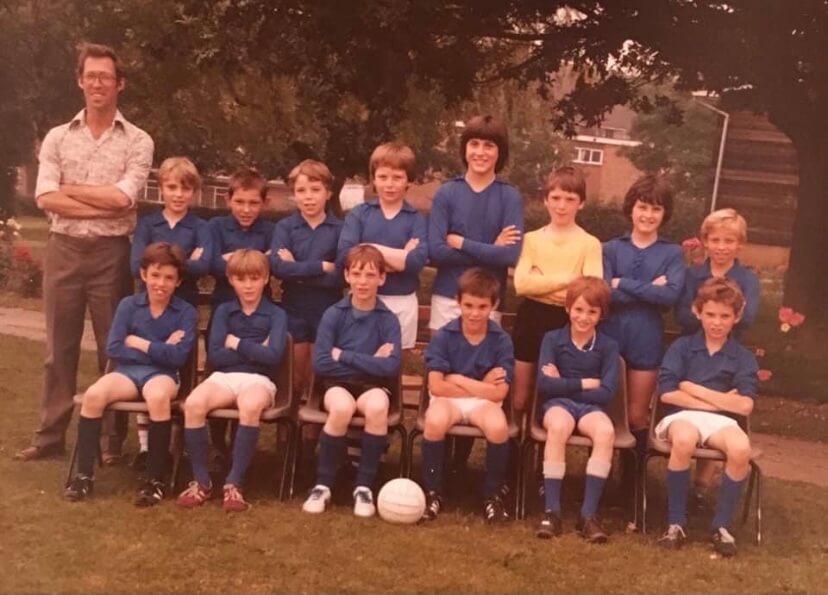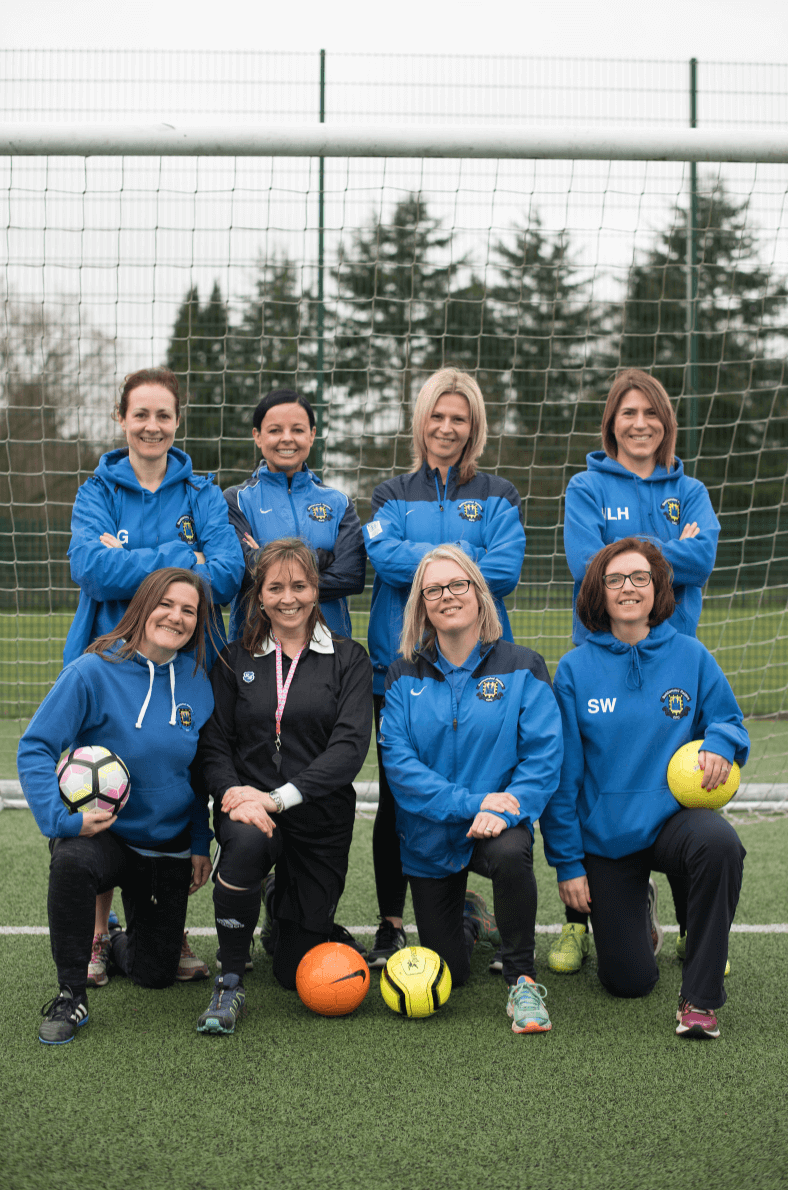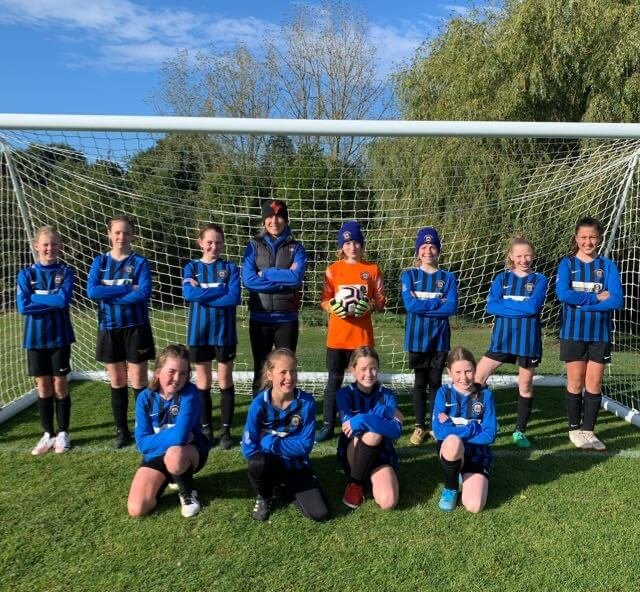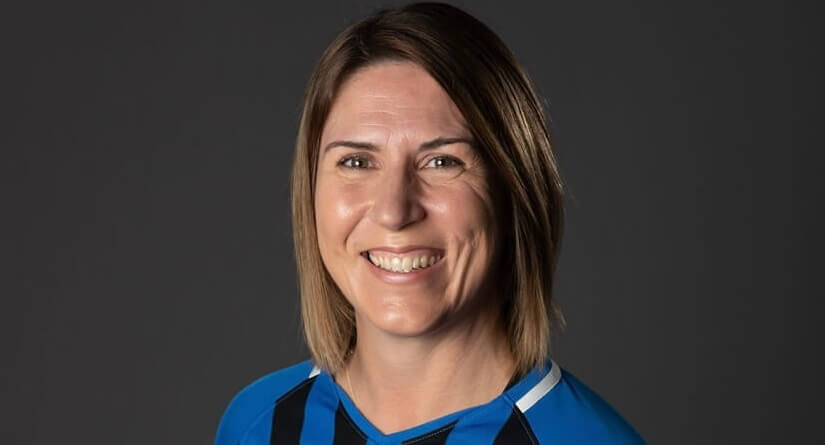Martina Hardy Interview – From Playing to Managing and Beyond
As part of our International Women’s Day activity throughout March, we recently spoke to Martina Hardy, manager and coach of the U12 Titans, to find out about her football playing years as a child, her subsequent journey with Raiders, and how she views the future of the game.
Berkhamsted Raiders: Martina, tell us about your relationship with football. How did it begin?
Martina: My dad was very sporty and loved football, and my older brother played. As a sporty child myself, it was natural for me to play too. We lived in this amazing close with loads of children and a park at one end. So I played with my brother and his friends and absolutely loved it. Playing with boys two and a half years older than me was a brilliant way for me to improve my skills and confidence.
BR: What did it feel like as a girl playing football at that age?

Martinas school football team
Martina: As a child who hated wearing skirts and loved to skateboard and climb trees, I never felt like I couldn’t play just because I was a girl. And the boys never questioned whether a girl should be playing football. I was just a child who loved to play, exactly like them.
BR: What about at school, did you get to play football there?
Martina: Yes, at first. Along with some other girls we created two teams – the Tomboy Terrifics and The Girlie Greats. Our PE teacher was supportive and agreed to ref our matches on a Friday lunchtime. He saw me play and asked me to join the boys’ team. The boys in the team were great and, like my brothers’ friends, completely accepted me as someone that loved playing football like them. My gender wasn’t an issue.
BR: This sounds amazing. What happened?
Martina: It changed when I went to secondary school. On the one hand lots of great sports were on offer like hockey, tennis and swimming. But on the other hand, when I asked if I could join the football team, I was categorically told, “No…although you can train with us if you want.” Without the chance to compete or a pathway to develop, I lost interest and refocused my passion to hockey – a sport that does not have the baggage football does with accepting girls and that is very similar to football.
BR: How did that make you feel?
Martina: I was angry and felt the injustice, because the truth was, I was more than good enough to play with the school team at that point in time. I wasn’t offered any support or guidance to find another way to play, for example with a girls’ team – they did exist at the time but were few and far between.
BR: Was that the end of football for you?
Martina: I played with my friends in the close and the park for a little while longer, and of course carried on being a huge fan and watching it on telly. But as for personal involvement in football, yes that was it for quite a few years.
BR: How did football come back into your life?
Martina: Berkhamsted Raiders, of course! My son Charley joined the Under 8s and I became a parent supporting their child in the freezing cold every Sunday and loving every minute. He is still playing in the U16’s. This got me into grassroots football again and reminded me what a fantastic, competitive game it is for children. My daughter Emiley began to show an interest in playing and showed she possessed some natural skill. Naturally, I was keen for her to play as well, to get the opportunity that I never had with a club that had a dedicated girl’s football offering, with real structure. She went for a trial for the U8s a few years later.
It turned out to be one of those fateful moments. In the email that came through offering Emiley a place, they also put a call out for someone to manage her team. I expressed an interest which, in classic Raiders style, was interpreted as, “I’ll do it!” – and then Emiley, who was hesitating, said if I was the manager then she would definitely join. Since then, neither of us have looked back – this is our fifth season with the club.

Dream Team
BR: Tell us about your time at Raiders. What’s it like being one of only a very few women managers?
Martina: I’m lucky to have started at the same time as fellow women managers Mary Pacitti, Jude Hardy and Nick Everitt. We went on our Level 1 together and developed a strong bond, which helped because as a woman you feel you must really prove yourself. I noticed that some of the attitudes of the men on our Level 1 tended to be split on generational lines. The younger guys were brilliant and supportive, but some of the older guys looked at us with a ‘raised eyebrow’ when delivering a drill. And when it came to joining in a drill, they could not bear to be beaten on the ball by a woman, and a couple of them would be especially aggressive. Behaviour like that does not intimidate me, it just makes me more determined to keep focused on being the best I can be. Mostly I have received very positive support and feedback along the lines of, that’s really cool, well done, what a great thing to do for your daughter and the girls.
This wouldn’t have been possible without Sarah Whale driving the expansion and development of the girls offering as a whole at this point in time, and Mary Pacitti driving the recruitment of the age group over the next three years. From our start at U8s and now at U12s, the age group as grown to 50+ girls, with 4 teams, all playing at 9v9. This is an exceptional achievement, and the development continues to be driven by the whole of the U12 Management Team – Mary, Amy Maloney, John Welbourne, Hil Kempe and myself.
BR: A great line up! Tell us a bit about the team you’re managing this season.

U12 Titans
Martina: I feel very privileged managing the U12 Titans – they are an exceptional and incredibly talented group of footballers. I have to ensure that they’re continually developing and being challenged. I’m very aware that they look to me as a role model, so no pressure!
BR: How can we encourage more women into the club, particularly into technical roles such as managers, assistant managers and referees?
Martina: Even after 5 years, when I go to train my team every Monday on BerkoAstro, as only one of three women, an inner voice says, “What do you think you’re doing?” That kind of imposter syndrome, or lack of confidence, is the barrier we have to tackle. Some women think they can’t do it, that they don’t understand the game, and that it’s a man’s world that’s closed to them. I don’t have an easy answer to it, but I know we desperately need more role models for the girls, and we need to show how much we value those role models. Our daughters need women to look up to, to emulate and be inspired by.
Another part of it for me is learning to celebrate our successes, and having the confidence to say, look at what we have done; look at how much we have achieved.
BR: And how about for girls who are thinking of joining the club as players? What’s your message to them?
Martina: I would say come and give it a go! Come and have fun with us. You will start your football journey and make great friends. And you will learn how to play this wonderful game – ball control, positioning, understanding movement on and off the ball, teamwork, and so much more. I’d also tell them that after every single training session and match without fail, it’s all-round smiles.
BR: Have you played again since your school barred you from playing for their team?
Martina: Yes! I trained with Raiders Women in 2016 for 2 seasons. Every Friday evening, we had half an hour of drills and then a match. It was great fun, a good standard and competitive. Sadly, the time stopped working for me so I had to give it up. Now I get my football fix on a Monday when I coach the girls.
BR: How do you see the future of women’s football?
Martina: There’s lots to be excited about – it’s more accessible than ever before, and the standard is phenomenal. I went to an Arsenal Women’s match that Raiders organised, and watched England players Leah Williamson and Beth Mead, who post-match strolled over to the fans and had their pictures taken with us. These are world-class players who are inspiring our girls and we must keep that momentum going – having an open door, challenging our girls to develop both on and off the pitch, building on their ‘can do’ attitude and confidence. So, I would love to see more investment from the FA, and ultimately, I would love for us one day to be talking about women’s football as simply football.
BR: And what about your future in football?
Martina: I was about to start my Level 2 before Covid hit, but it had to be put on hold. I’m keen to get going again when normality resumes. It’s a lot of work but I’m really looking forward to it.
BR: Any final thoughts on anything (women’s) football related?
Martina: Yes, I’d like to give a shout out to the past. A friend recently gave me “The Secret History of Women’s Football” by Tim Tate. Reading about the women footballers in the 1880s who stood their ground against public apathy and ridicule to do what they loved – play football – it made me truly appreciate the debt that we owe their strength and determination to find ways to play whilst facing blatant discrimination. We have come a long way, but we still have a lot more to achieve!
